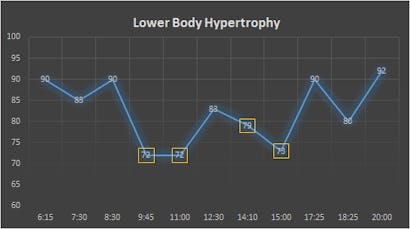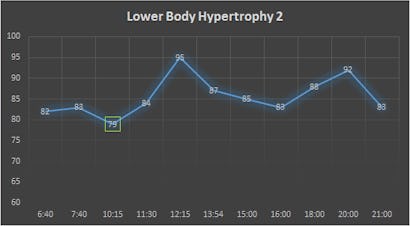“One of the most essential things a person can do for their health and performance is work toward keeping blood sugar balanced.”
-Datis Kharrazian DHSc, DC, MNeuroSci
Everyone handles carbohydrates differently. Some people look at a sweet potato and everything jiggles. Some humans can pound an entire sheet of brownies and still maintain the figure of a Greek god or goddess.
I am somewhere in the middle. When I was little, my mom fattened me up on a Midwestern smörgåsbord of toast and cereal. Then, like most in my early twenties, I counted and controlled everything to get lean. As I have progressed in my practice, I have learned that counting carbs is just not enough. It turns you into a type A analtard that no one likes. You have Excel spreads littering your desktop and MyFitnessPal on speed dial. These are important data points, but you have to complete the picture.
The problem with carb counting is that you have no idea what is happening inside your body. You have a bunch of near meaningless numbers because you don’t have an outcome variable. You might have some distant goal, but what that means is that you are running a long term intervention trial with body fat, weight, or waist circumference as your outcome variable when you need to start running a short-term controlled feeding trial.
I have been running experiments on myself consistently for 10 years and at the academic/university level for 4. The outcome variables have been diverse from performance variables to measurements such as: fasting blood work, glucose tolerance tests, Adrenal Stress Indices, or even body fat percentage and distribution via BODPOD, MRI, and DEXA.
In planning a long term intervention, we will usually go with 8 to 12 week blocks, but you have to figure out what is the best course of action inside of those blocks to have a shot at getting where you want to go. Enter the glucometer.
A glucometer is a cheap and relatively precise and accurate way to see how your body is responding to carbohydrates. I am currently testing a plethora of biomarkers as well as Body Fat percentage every 90 days (we also do this with the majority of our clients). I am also trying to find the best types, amounts and timing of my carbohydrate intake for the current 90 day block. This means I have to prick myself – a lot – because what I need is directly reflective of what kind of work load I take on in the gym.

For example, on an upper body hypertrophy day, eating about 45% CHO, 30% PRO, and 25% Fat, I still drop into a hypoglycemic zone after training. This means that my lower carb breakfast doesn’t have enough life in it to keep me from free falling into the shakes post-workout. Now take a look at that same day of eating on a lower body hypertrophy day.
This day was a train wreck. Due to all the sets to failure using larger muscle groups, my insulin sensitivity was through the roof well outside the insulin independent window post workout. This means that I am going to have to completely retool this day. Davis and I brainstormed, we make some tweaks and voila.
Zero true low blood sugar episodes. I was much more productive, got my fat burn in the AM, then flipped and stayed anabolic (and thus controlling unneeded cortisol spikes) throughout the rest of the day.
Some things to keep in mind, these are very high level dietary tweaks. I would never start a client on this type of intervention right out of the gates. There is too much low hanging fruit in areas of Quantity, Quality, and Timing. I have been doing this for a very long time, so my diet is completely allergen free, nearly all organic, includes well over ten servings of vegetables a day, and is a highly personalized version of a carb-backloading protocol with an AM training time to help with circadian rhythm.
Data is great, but you have to make sure that your data tells a story. What I see people do most often is collect a little bit of data. This is dangerous especially for people who like to control every element of their lives because you have to have outcome variables other than scale weight. The other side of the coin is that all the data in the world is meaningless unless you can do something about it and stick to the changes you make. You need to critically observe, plan the intervention, and then execute. Game Over.



)





